![]()
Well I’m finally stumped for words. A party affiliated president, now
has the triple roles of president, head of the military and head of
the ‘neutral’ caretaker government. While rumours of a military
takeover abound, and the prime minister’s son threatens that they will
not go to the streets ’empty handed’, the news that the leader of the
opposition has not threatened immediate protests, but has rather opted
to see how the new head of the caretaker government conducts himself,
is a healthy sign. Too many lives have already been lost.
A lot of changes need to take place to erase the mistrust created. A
genuinely non partisan group of advisers need to be selected, the
election commission and the voters list, both clearly not neutral,
need to be changed, and he has to clearly demonstrate that he is no
longer a puppet. Unlikely based on his track record, but one can hope.
Given the current mood, another sham election will surely light the
fuse.
Shahidul Alam
29th October. Dhaka
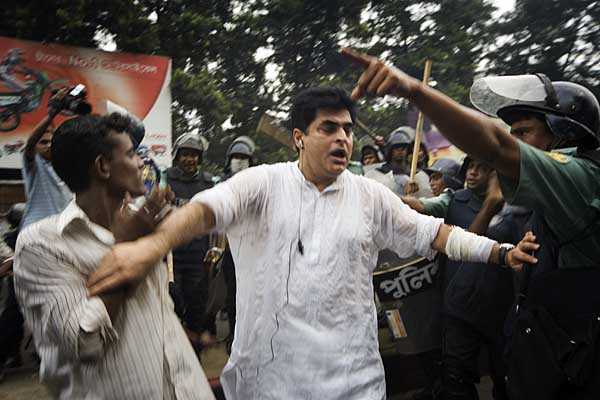
Clashes between opposition and Jamaat due to demand for neutral head of caretaker government. (upload incomplete)
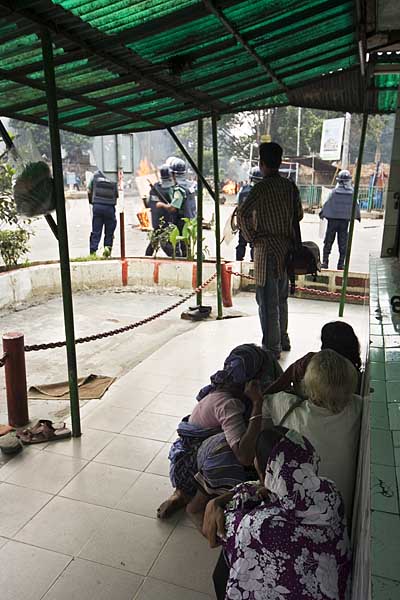
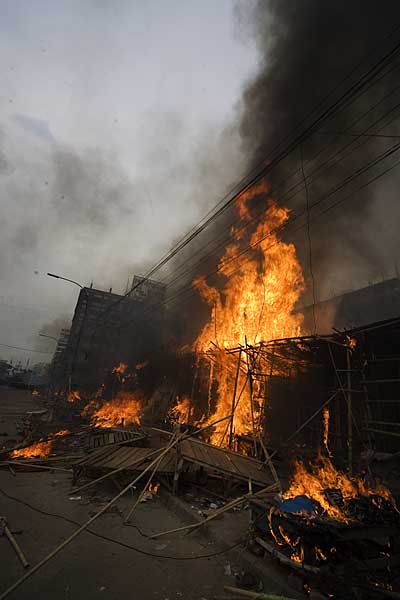
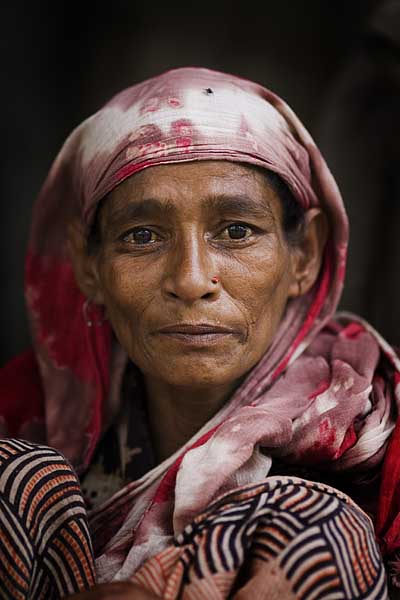
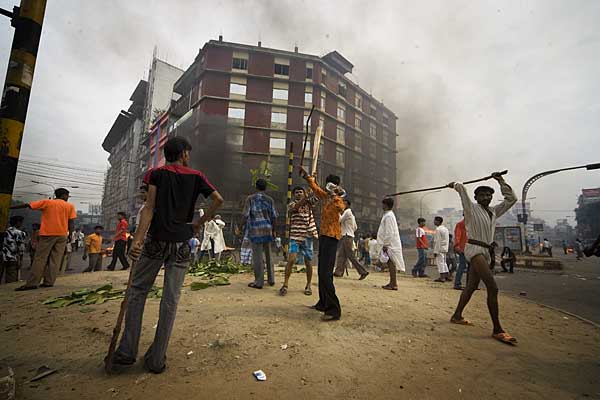
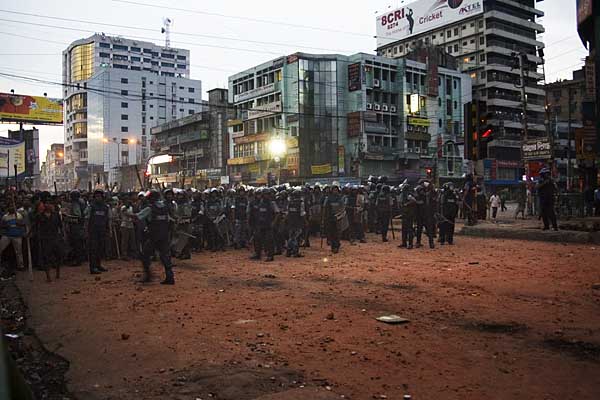
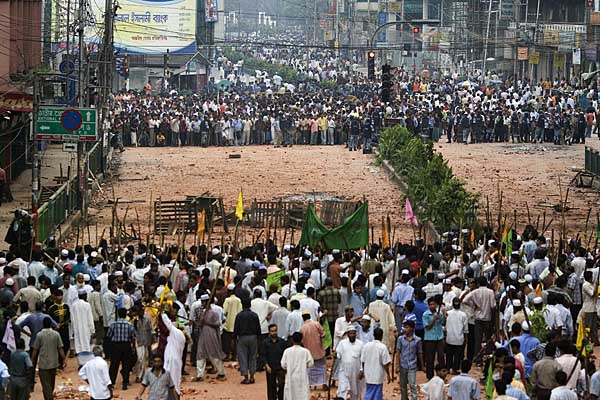
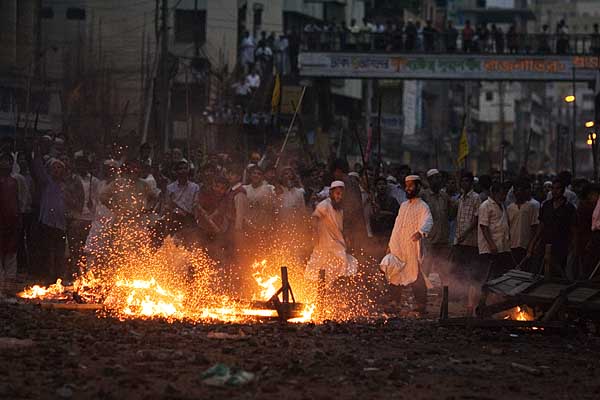
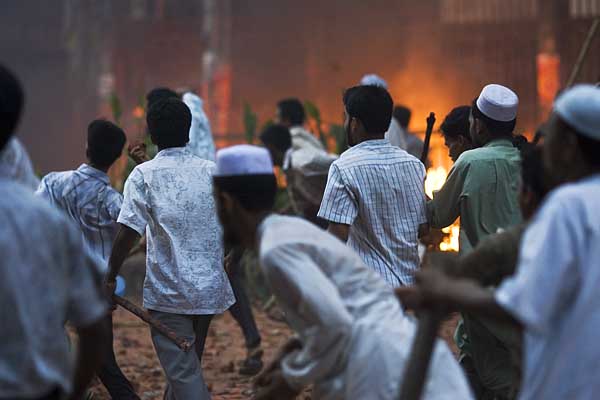
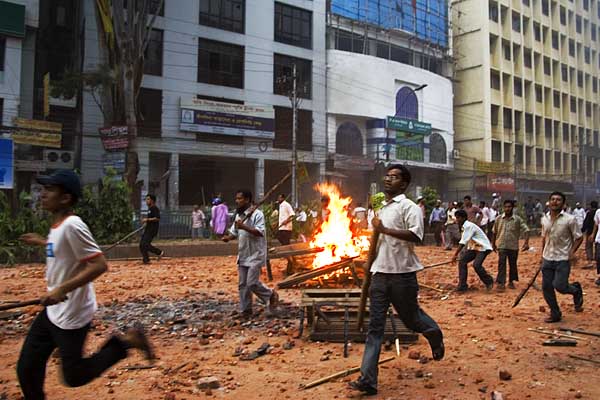
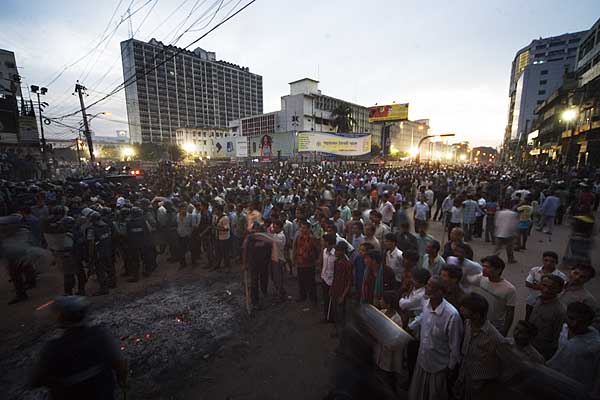
Above photographs taken on 28th October 2006 by Shahidul Alam.
And today 29th October 2006, a party affiliated president, makes himself president, head of military and head of ‘neutral’ caretaker government. Today’s photographs taken by Shehab Uddin. No unauthorised copying of any kind. To publish these or high res images, contact library@drik.net. More pictures and text to follow.
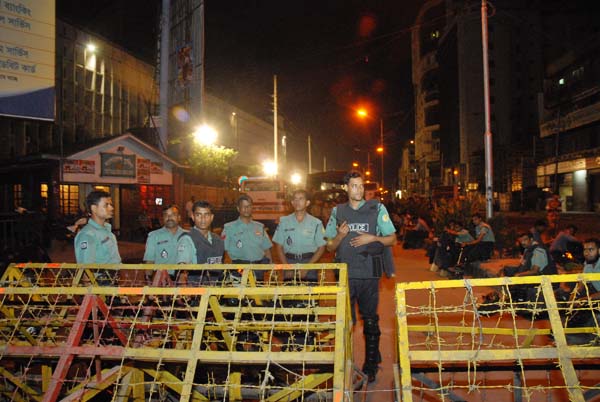
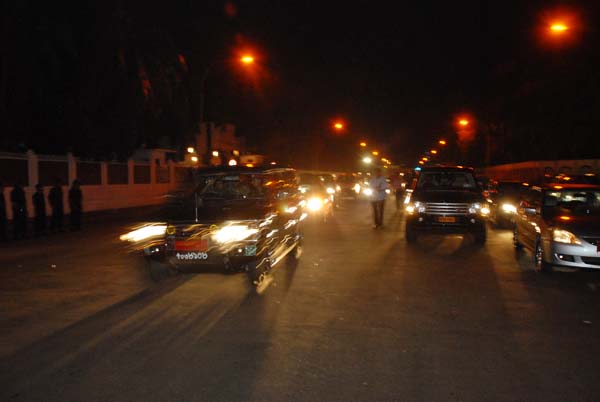
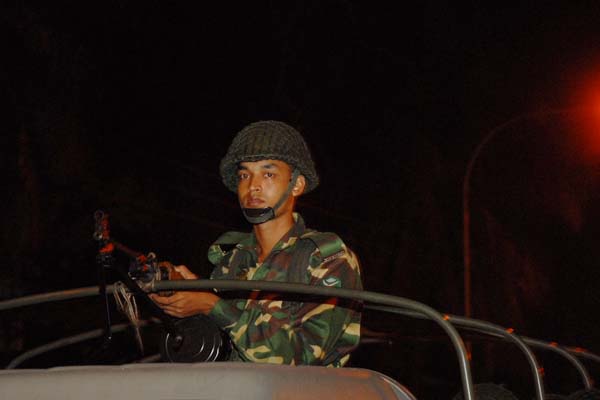
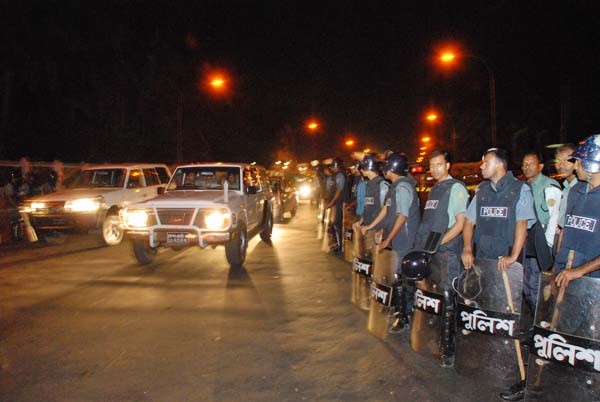
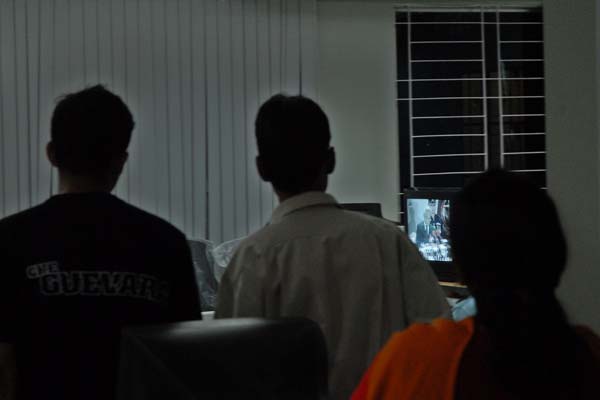
On One Eid Day
Dr A.K.M. Abdus Samad, the director of the mental hospital in Hemayetpur, Pabna, was pragmatic. “An average of 2% of all populations are schizophrenic, and of course there are many other mental ailments. In this country of 130 million, we have one hospital with 400 beds. What do you expect? The government allocation for food is 18 Taka per day (about 45 US cents when we met in 1993). Many mental patients are hyperactive and need more food. A good portion of that 18 Taka goes to the contractor, the remainder has to provide three meals a day. So what can I do? I make sure they get plenty of rice. That way they at least have a full stomach. We have little money for drugs, and virtually no staff for counselling, so we keep them doped. Then they don’t suffer as much.”
The other doctors had a different take. “Pity you’ve come on a Friday they said. On a weekday we could have shown you an electric shock treatment.” It seemed to be a popular ‘treatment’. To the uninitiated like me, the violent convulsions and the near comatose state the patients lay in afterwards didn’t seem to be the way to treat anyone. The care givers differed. The treatment was generally given to suicidal patients they said, and the way they saw it, it was “better than letting them kill themselves.” I didn’t have much of an argument against that one.
I saw the group of visitors come round to the dorms at night and peep through the windows. It was well after visiting hours, but they had paid to get in and have a look at the ‘pagols’ (loonies). On Eid day, many would dress up and come to the peep show. Some patients did get visitors on Eid, a select few even got new clothes or special food, but for most, it was another day of waiting. Another day of hoping that someone close might come and take them away.
In every ward I went, someone would take me aside, and slip a note in my hand. Invariably, scrawled in that note would be an address. “You must take it to them (their relatives). Tell them I’m OK. Tell them to take me away from here.” The first few times I did try and contact those relatives. Some addresses had people who recognised them, most didn’t. None seemed keen on responding. Eventually I gave up, but I would still take the notes. In Hemayetpur, even false hope seemed something worth giving.
—————————-
As another Eid approaches, I remember the child Shoeb Faruquee had photographed in Chittagong. It won him an award at World Press Photo, but I wonder where the child is now.
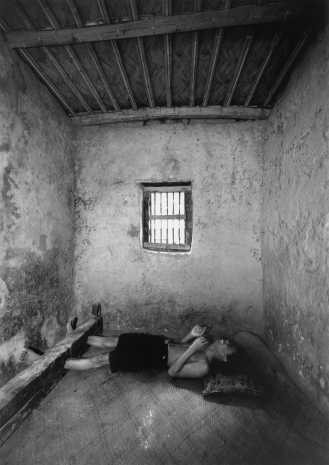
Patient at mental hospital, Bangladesh
? Shoeb Faruquee, Bangladesh, Drik/Majority World
Mohammad Moinuddin had yet another story to tell:
http://www.newint.org/columns/exposure/2006/08/01/md-main-uddin/
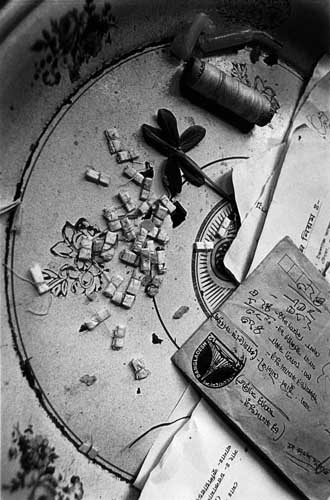 ? Md. Mainuddin, Bangladesh, Drik/Majority World
? Md. Mainuddin, Bangladesh, Drik/Majority World
I was on an assignment at Domra Kanda, an asylum for the mentally ill in Kishoreganj, Bangladesh, where the only medications provided are these ?medallions? filled with spiritual spells and ?blessed water? from traditional spiritual healers. Illiteracy about medical treatments ? particularly those related to mental health issues ? misconceptions and limited health facilities mean that many parents resort to their faith in such medallions and other blessings from spiritual healers. The clinics which provide such traditional solutions do not offer scientific medications of any type and neither are they approved by any health authority. But for many Bangladeshis, faith in traditional healers and their treatments is more powerful, effective and easily available than scientific medication. The parents strongly believe that it is their faith in such spirituality that will cure their child and bring back the long lost peace and happiness to their family.
———————————————————————————————————————————————————
In a world where normality is a virtue, I salute the few individuals who have chosen to be different.
Shahidul Alam
23rd October 2006. Dhaka
ps: Apologies to ZAK on my spelling of Eid: http://www.kidvai.com/zak/2005/11/its-that-time-of-year-again.html
Bank for the Poor
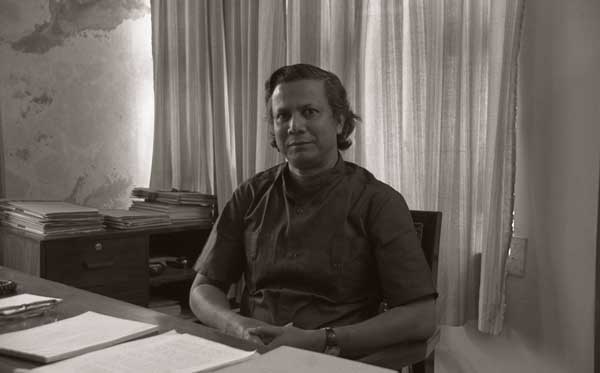
It was 1988. The flood waters had reached Dhaka, and I needed a boat to get to the head office of the Grameen (Rural) Bank. A soft spoken unassuming gentleman, casually clad, sat at a plain wooden table. There was no air?-conditioning and the fresh breeze flowed freely through the open windows. My posh camera seemed quite out of place here.
Dr. Muhammed Yunus shook my hands warmly and words flowed easily from the man who had created one of the most remarkable organisations in banking history.



The Grameen Bank gave money only to the poor. Loans to the landless were interest free. None of the debtors had collateral. 75% of the bankwas owned by the landless who could purchase shares of Take 100 (about two pounds; each in 1988. Only one share was allowed per person). The bank boasted 346 branches and 3,000,000 members, 64% of whom were women. Incredibly, about 98% of the loans were returned! It was rapidly expanding and by the following year, Yunus hoped to have 500 branches.
An economics graduate from Vanderbilt University, Yunus had been teaching at Tennessee State University when war broke out in Bangladesh in 1971. He got actively involved in the liberation movement and returned to the newly created nation in 1972 and took up teaching at Chittagong University.
The famine in ’74 touched him deeply. The sight of the dying in the streets made him question the validity of the economic theoories that he espoused. During this soul searching he mixed intimately with the villagers and learnt of their habits, their values and their problems. One of them was a woman who made Moras (bamboo stools). She was skilled and conscientious and worked long hours. He was appalled when he discovered that she earned only eight annas (about one pence) for her daily labour! Angered and dismayed, he sought out the reasons for this shamefully unfair setup.
It had long been claimed that laziness, lack. of skill, and extreme conservativeness was the root cause of poverty in Bangladesh. Here was a woman who was skilled, worked extremely hard and had taken the initiative of setting up a business for herself and was still being cruelly exploited.
She did not have the money to buy the bamboo, so she had to borrow from the trader. He paid a price for the finished stool which was barely the price of the raw materials. She ended up with a penny a day!
With the help of a student Emnath, Yunus made up a list of 42 people who worked under similar conditions. He paid out their total capital requirement of Taka 826 (less than a pound per head) from his own pocket. It was a loan, but it was interest free.
Aware that this was not the real solution to the problem, Yunus approached his local bank manager. The man laughed. The idea of giving money to the poor, and that too without collateral, was to him hilarious. Undeterred, Yunus approached the assistant general manager of Janata Bank:, Chittagong. The manager was encouraging,, but felt that in the absence of collateral, a guarantee by influential people in the village would be necessary. Yunus realised that this would eventually lead to some sort of a slave trade. The bank was adamant, and eventually he talked them into accepting him as the guarantor. The manager was reluctant in the beginning, but felt he could take the risk, the sum being so small.
The system worked, all the loans were repaid and more people were offered loans. Yunus suggested that it was time the bank took over the responsibility themselves and lent out money directly to the villagers.?So I tried to establish that this could be done as a business proposition. I became vocal against the banking institutions, arguing that they were making the rich people richer and keeping the poor people poor through something called collateral. Only a few people could have access to funds. The bankers were not convinced.
Finally they challenged me to do it over a whole district, not just a few villages. They said if I could do it over a whole district, and still come back with a good recovery, then they would reconsider. I accepted their challenge. They asked me to go far away, to where people would not recognise me as a teacher but would instead think I was a banker. So I went to a far flung district in 1978, and started working there.”
It worked beautifully. They had almost a 100% recovery. The small loans made a big difference to the people, but the banks still dragged their feet. Yunus realised that if he went back to the University, the project would die. He suggested the formation of a new bank. One owned by the people themselves. The banks were skeptical, but he got a lot of public support, and eventuual1y in October ’83, an independent bank called the Grameen Bank was formed.
Dr. Yunus is modest about his own contribution. Asked if the bank would survive without him, he smiled “Look at what we have achieved, could it ever have been possible without dedication at all levels ??
There is a more important reason for the bank’s survival. Contrary to most other viable commercial banks, this one is truly designed to serve the people.




Always quick to accept innovations, Professor Yunus was the first person to order an email account when we set up Bangladesh’s first email service in the early nineties. He was user number six, the first five accounts being Drik’s internal numbers. Later he ordered the entire Grameen office to be networked and had generic email addresses issued to key personnel.
The bank now has nearly six and a half million members, 96% of whom are women. The $ 5.3 billion given out as loans and the $ 4.7 billion recovered are figures any commercial banker would be proud of. Since then other Grameen entities under the more recently formed Grameen Foundation have been born. Grameen Phone, a highly successful telecommunications company has provided phones to rural women, many of whom have become successful entrepreneurs. However both the Grameen Bank and micro-credit have had critics. The high rate of interest is seen to be exploitative by many. There have been accusations that the methods of recovery, often by overzealous bank officials, have led to extreme hardship. 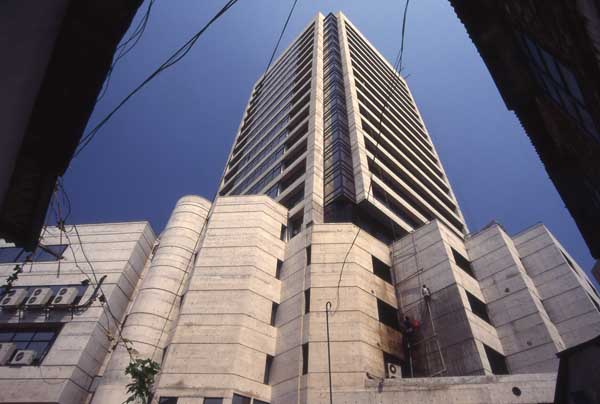
The skyscraper that now houses the bank, many feel, distance it from the poor it represents. The close links with Clinton and Turner, and the uncritical position taken by Yunus in his public interactions with them, has also been viewed with suspicion. Yunus makes light of these observations. Regarding the criticism of his model, he has a simple answer. ?I make no claims to having a perfect system. The problem has to be solved. Should someone come up with a better solution, I would happily adopt it.?
Bangladesh has largely been known for floods famine and other disasters. Yunus has provided Bangladesh with a pride it badly needs. Many had hoped that he would enter politics, providing an alternative to power hungry politicians that people have lost trust in. While he has steered away from mainstream politics, Yunus was an adviser to the caretaker government. That this popular teacher turned banker should be the Nobel Peace Prize winner in 2006 is a source of great joy to Bangladeshis, but an honour they feel was long overdue.
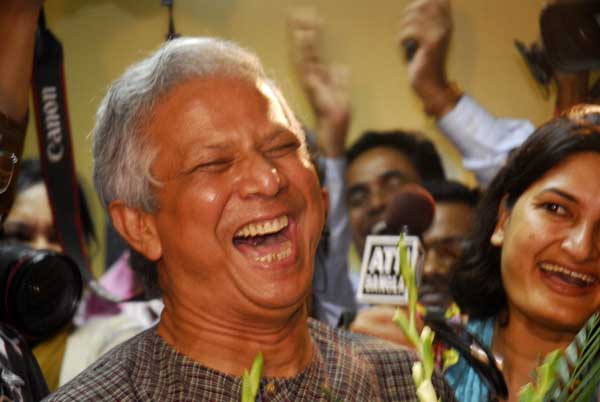
(Photo by Munem Wasif / DrikNEWS)
Shahidul Alam
Drik Picture Library Ltd.
Dhaka 1988 and 2006
High resolution photographs available from Drik Picture Library: library@drik.net
and DrikNews: driknews@gmail.com, driknews@yahoo.com
Thailand coup d'?tat
?There?s been a coup d’?tat,? said Cherrie breaking into our meeting at the Imperial Tara Hotel in Bangkok. Some of the participants have just returned from shopping and there were little signs of the unrest that it implied. My camera had been handed in for repairs, and my first instinct was to see who had one I could borrow. Suvendu kindly and only half reluctantly offered his. Zaheer and I decided to go out, but he returned soon afterwards, seeing the pouring rain.
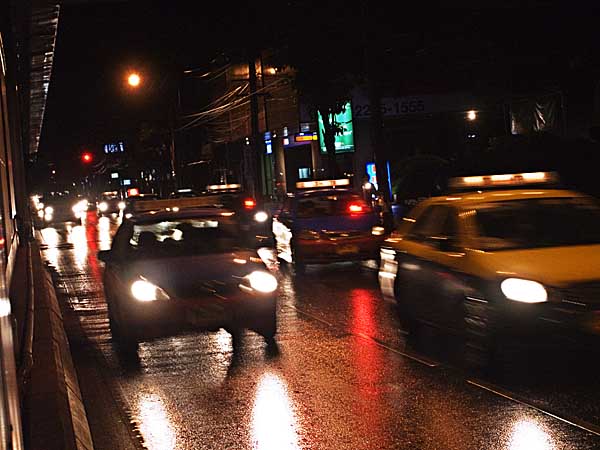
There was some housekeeping to be done. Several participants were due the next day and decisions needed to be made as to whether they should make the trip. Spending as little time as I could get away with, I clutched Suvendu?s camera and broached the rain. Some shops had closed, but there were people in the streets. The Japanese restaurant at the end of Sukhumvit Soi 26 wasn?t full, but did have customers.
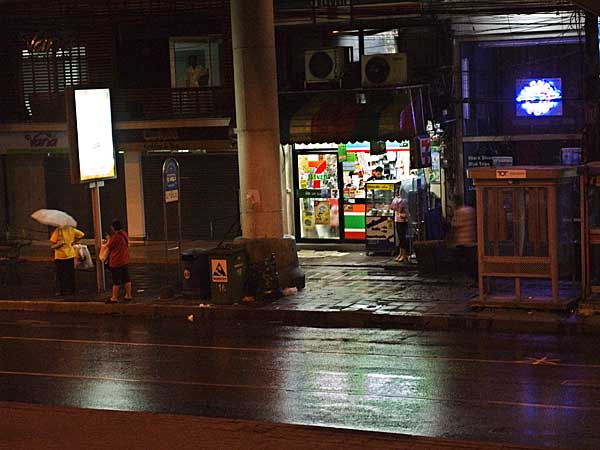
Zaheer needed a SIM card, but the girl in the 7/11 simply said ?no card?. Military takeover, or political unrest didn?t seem to pervade the air.
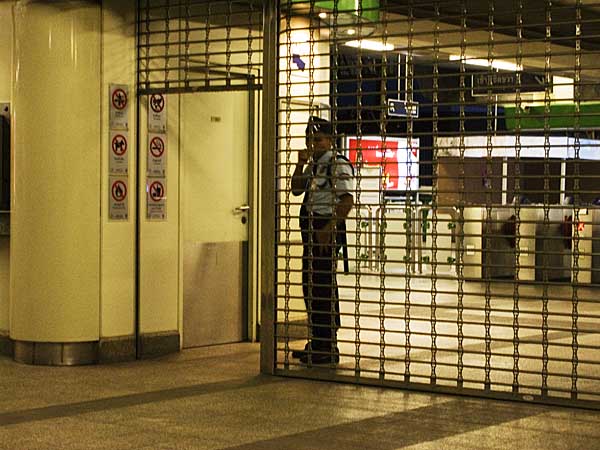
The train station was closing, perhaps a bit earlier than usual as it wasn?t midnight yet, but the traffic in the streets seemed normal. People outside the 7/11 waited for the bus as they normally do.
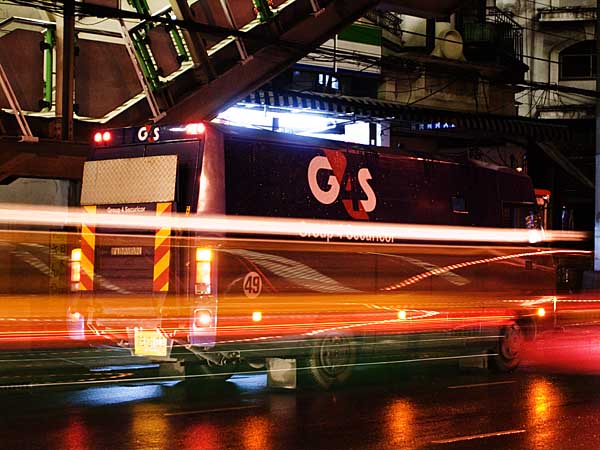
Must try and sneak out of the meeting tomorrow to go downtown where the tanks are meant to be, but here the only sign a conspiracy theorist could use as ammunition was the Securicor car waiting outside the bank. Perhaps an ominous sign.
Shahidul Alam
Imperial Tara Hotel
Bangkok
Profits versus the Poor
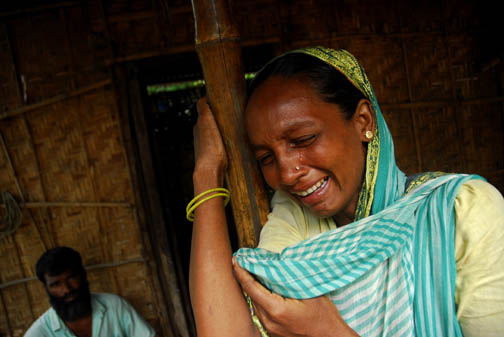 ?I have lost a son, maybe I?ll lose another, but I won?t let them setup a coalmine here.? To Tahmina Begum who had lost her son Toriqul to police bullets, her land was also her family.
?I have lost a son, maybe I?ll lose another, but I won?t let them setup a coalmine here.? To Tahmina Begum who had lost her son Toriqul to police bullets, her land was also her family. 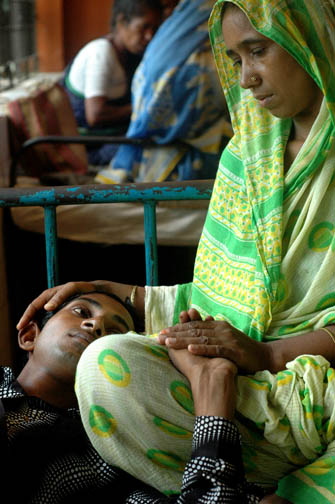 It could have been a ?B? rated western except that it is set in the east.
It could have been a ?B? rated western except that it is set in the east. 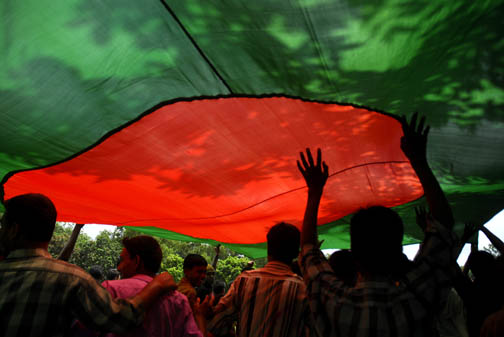 People wanting to hang on to their ancestral land versus mining companies wanting huge profits. There have been only minor changes from previous scripts. When farmers wanted fertilizers and seeds, the police had opened fire killing them, when they wanted electricity to irrigate their soil, the police had opened
People wanting to hang on to their ancestral land versus mining companies wanting huge profits. There have been only minor changes from previous scripts. When farmers wanted fertilizers and seeds, the police had opened fire killing them, when they wanted electricity to irrigate their soil, the police had opened 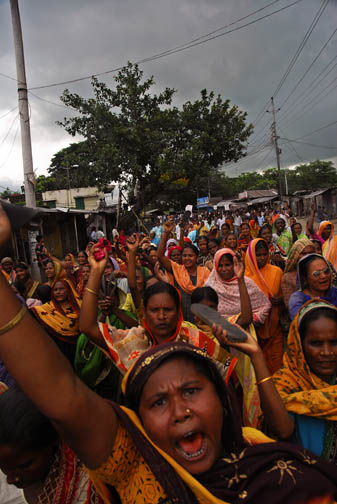 fire killing them. Now that they want to retain their land rather than have it converted into coal mines again the police have opened fire killing them.
fire killing them. Now that they want to retain their land rather than have it converted into coal mines again the police have opened fire killing them. 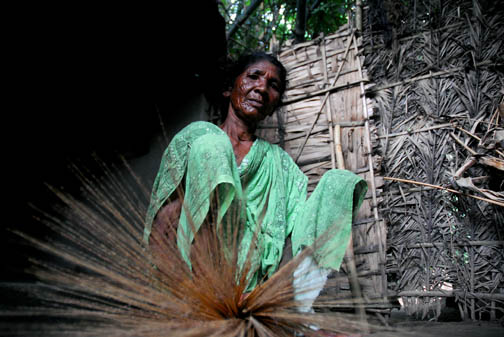 The Shaotals, being indigenous minority groups, find themselves even more vulnerable within this persecuted community. In the shootings on the 26th September 2006, in Phulbari, Dinajpur, in northwestern Bangladesh, at least six villagers are known to have been killed, over a hundred are said to be missing.
The Shaotals, being indigenous minority groups, find themselves even more vulnerable within this persecuted community. In the shootings on the 26th September 2006, in Phulbari, Dinajpur, in northwestern Bangladesh, at least six villagers are known to have been killed, over a hundred are said to be missing.
The Watchmaker: Pablo Bartholomew
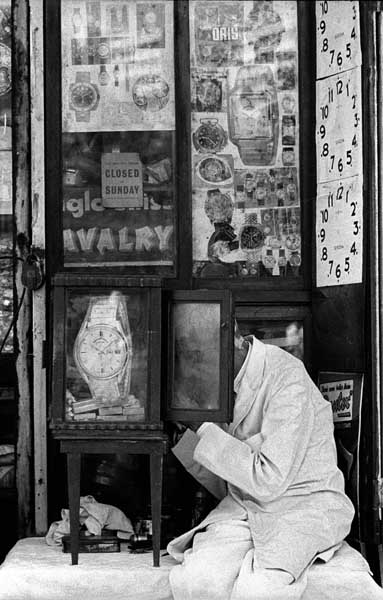
In the early 1980s, when this photograph was taken in Bombay (now Mumbai), the old world still survived with the changing and the emerging new world. Near Princess Street, this watch repairer worked from the small space of his shuttered kiosk. He must have spent his lifetime working there. Maybe his father sat in the repair kiosk before him?
A few years before, I had moved from Delhi to seek my fortune. The big city life attracted me, offered me opportunities to work in advertising and the film industry.
When not working on film sets or doing advertising jobs, I would wander the streets of south Bombay. It is during this period that I photographed the vibrant life of the city?s fringes, wandering amongst the eunuchs, prostitutes, opium dens, rag pickers or just the old world parts of the city. In that way I was a true documentary photographer then, though I worked at other crafts of photography to earn a living. Later I got sucked up into photojournalism, which took up so much time that it altered a lot of my work spheres. After a quarter of a century, I need to and want to go back to my roots in documentary photography.
Pablo Bartholomew. India
www.newint.org
Housing in S?o Paulo: Carlos Cazalis
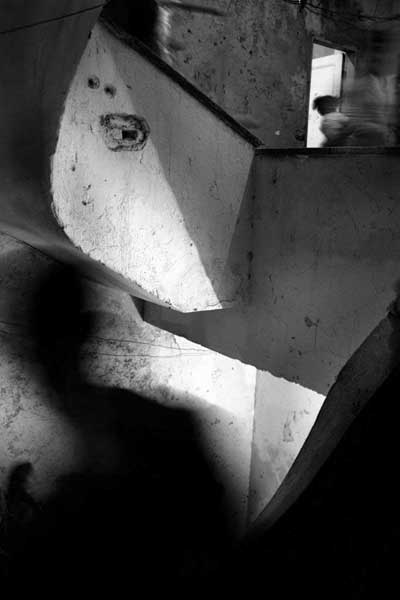
People move up and down the stairs of the 22-storey-high Prestes Maia 911 building in downtown S?o Paulo, Brazil. The building lacks proper electricity, water, plumbing and an elevator. In 2003 over 1,500 people, along with the support of the Movement for the Urban Roofless or MSTC ? the counterpart of the rural landless movement MST ? occupied the building in an effort to find decent housing. They had to clean out from it enough garbage and sewage to fill 300 trucks.
There are over 3,000 unused buildings in S?o Paulo, while hundreds of Brazilians arrive in the city looking for jobs and better living conditions. The city population is already over 20 million and growing, with most people living in the sprawling slum areas.
The photographer Carlos Cazalis was born in Mexico, but lives in S?o Paulo.
www.newint.org
I hear the screams
![]()
Even after years of playing Pied Piper with a camera, I am still taken aback by children insisting on being photographed. It was September 1988, and we had had the worst floods in a century. These people at Gaforgaon hadn’t eaten for three days. A torn saree strung across the beams of an abandoned warehouse created the only semblance of a shelter. Their homes had been washed away. Family members had died. Yet the children had surrounded me. They wanted a picture.
It was dark in that damp deserted warehouse, but the broken walls let in wonderful monsoon light, and they jostled for position near the opening. It was as I was pressing the shutter that I realised that the boy in the middle was blind. He had pushed himself into the centre, and though he wasn’t tall he stood straight with a beaming smile.
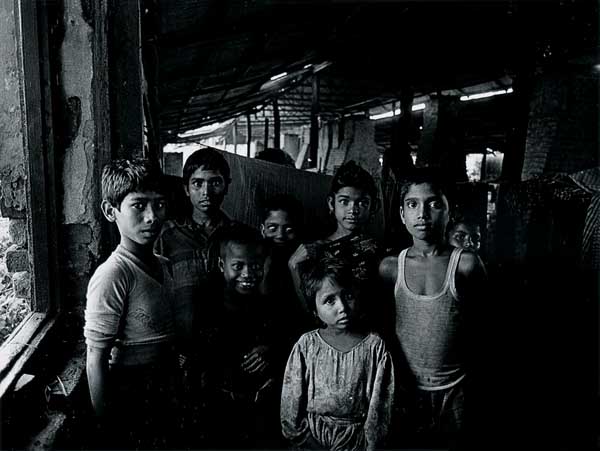
Shahidul Alam/Drik/CARE
Clip on story of the blind child, from keynote presentation on citizen journalism at 50th Anniversary of World Press Photo in Amsterdam.
I’ve never seen the boy again, and today I question the fact that I do not know his name. But he has never left my thoughts and often I have wondered why it was so important for that blind boy to be photographed.
It’s happened elsewhere, in boat crossings at the river bank. In paddy fields heavy with grain, in busy market places. A shangbadik (literally a journalist, but in practice any person with a half decent camera) was hugely in demand. They refused to take the fare from me at the ferry ghat. Opened up their hearts and told me their most personal stories. Confided their secrets, shared their hopes. Never having deserved such treatment it has taken a while for me the photographer, to work out why being photographed meant so much to that blind child.
The stakeholders of Bangladeshi newspapers are the urban elite. Consequently stories from the village are about the exotic and the grotesque. Village people exist only as numbers, generally when plagued by some disaster and only when figures are substantial. A photograph in a newspaper, regardless of how token the gesture, is the only time a villager exists as a person. A picture on a printed page would have lifted that blind boy from his anonymity. That humbling thought stays with me whenever I am feted as a shangbadik in some small village. I receive their gift of trust gently, careful not to break the delicate contents.
It was as a photographer of children that I had begun my career. It was way before 9/11 and one could make appointments with strangers and go to their homes. I took happy pictures of kids, and parents loved them. It was easy money, except when I would photograph the children of poor parents. They loved the pictures but couldn’t afford to pay, so I would quietly leave the pictures behind and pay the studio out of my pocket. Back in Bangladesh, the only way I could make money was as a corporate photographer, but something else was happening. We were in the streets, trying to bring down a general who had usurped power. I didn’t know it then, but I was becoming a documentary photographer. Suddenly taking pictures of children meant more than smiling kids on sheepskin rugs.
As the pressure against the general mounted, I photographed children who joined the processions. The night he stepped down, I photographed a little girl with a bouquet of flowers. She was out with her dad in the middle of the night, celebrating the advent of democracy.
I am back in Kashmir eight months after I had been here photographing the advent of winter. The valleys of this fertile land are green with new crops, 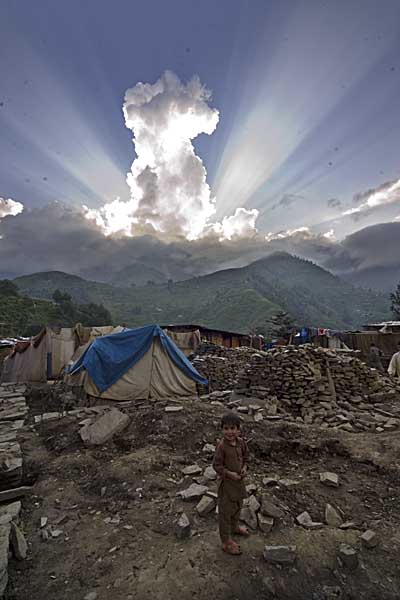
Shahidul Alam/Drik/CONCERN
but many of the homes are still to be rebuilt. As I walked through the rubble, the kids again wanted to be photographed.
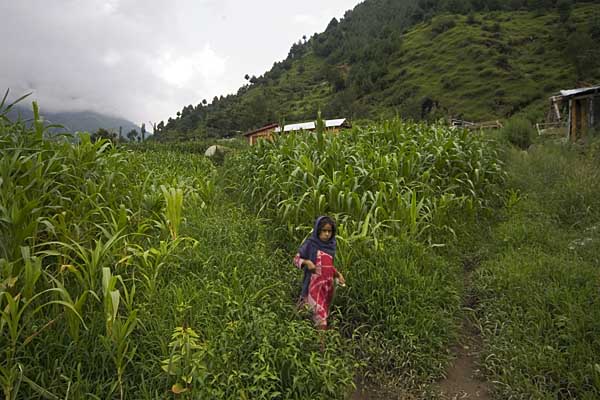
Shahidul Alam/Drik/CONCERN
Najma came running, her bright red dress popping out of the green maize fields.Unsure at first, she smiled when I told her she had the same name as my sister.
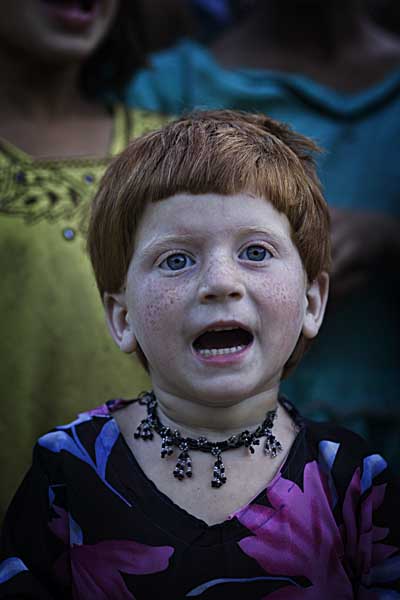
Shahidul Alam/Drik/CONCERN
Zaheera, a cute girl with freckles, gathered her friends and sang me nursery songs. But my thoughts are far away. Despite the laughter and the nursery songs very different sounds enter my consciousness. I remember the children screaming on the night of the 25th March 1971, when I watched in helpless anger as the Pakistani soldiers shot the children trying to escape their flame throwers. The US had sent their seventh fleet to the Bay of Bengal, in support of the genocide. Today, as I remember the Palestinians and the Lebanese that the world is knowingly ignoring, I can hear the bombs raining down on Halba, El Hermel, Tripoli, Baalbeck, Batroun, Jbeil, Jounieh, Zahelh, Beirut, Rachaiya, Saida, Hasbaiya, Nabatiyeh, Marjaayoun,Tyr, Jbeil, Bint Chiyah, Ghaziyeh and Ansar and I hear the screams of the children. Piercing, wailing, angry, helpless, frightened screams.
News filters through of the children killed in the latest bombing. The photographs have kept coming in, horrific, sad, and disturbing. Mutilated bodies, dismembered children, people charred to ashes. But none as vulgar as those of Israeli children signing the rockets. Death warrants for children they’ve never known.
I remember my blind boy in Gaforgaon. The Lebanese and the Palestenians are also people without names. Their pain does not count. Their misery irrelevant, their anger ignored. Sitting in far away lands, immersed in rhetoric of their choosing, conjuring phantom fears necessary to keep them in power, hypocritical superpowers fail to acknowledge the evil of occupation. The ‘measured response’ to a people’s struggle for freedom will never in their reckoning allow a Lebanese or a Palestinian to be a person.
When greed becomes the only determining factor in world politics. When the demand for power, and oil and land overshadows the need for other people’s survival, I wonder if those screams can be heard. I wonder if those Israeli children will grow up remembering their siblings they condemned. I wonder if through all those screams the war mongers will still be asking “why do they hate us”?
11th August
Siran Valley, North West Frontier Province, Pakistan
Sitting on a man’s back
![]()
Three bombs had gone off the day before, and they weren’t comfortable about me walking on my own in the streets of Kabul.
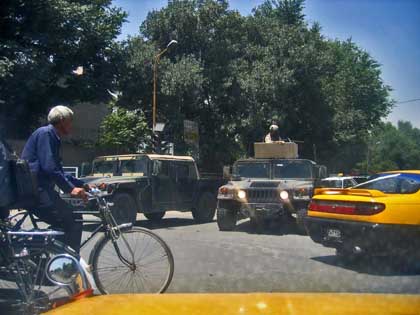
The driver insisted that he gave me a lift. The suggestion that a particular hill not too far away would give me a good view of the city was a good one, and the late evening light was just leaking through the haze. He offered to stay to give me a lift back, but I wanted to be on my own, and writing down that I needed to get back to Choroi Malek Asghar, I wandered off, free at last. Coming down the hill, I wandered through the back streets as I tend to do in cities I am new to. An odd conversation in my broken Urdu helped. As always kids wanted to be photographed, and wherever I went, people offered me cups of tea, or invited me home.
Abdul Karim latched on to me. Insisting that I visit his family, he took me through the narrow winding mud path that led to the tiny doorway that was the entrance to his home. My first task was to take photographs of the family. I had none of the language skills he had, but it didn’t seem to matter. Initially surprised by this stranger the man had brought home, the family quickly turned to more important things, like being hospitable to this mehman (guest).
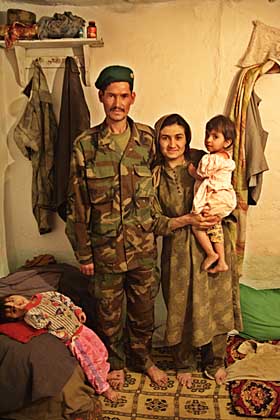
I gesticulated wildly enough to convince them that I needed to catch the light while it was there, and Abdul Karim became my self appointed guide. I could go and take some photographs, but was to come back and have tea. The sun had almost set by the time we were back up the hill. A lone runner ran circles around the flattened top of the hillock. Football fever had set in and the shouting of the kids chasing a ball in the dried up swimming pool in the centre, carried through the evening sky. Four young men came up and made conversation. Two of them had been to Pakistan, and we spoke in Urdu and in English. One was an out of work webmaster, and wanted my email address. They posed, I photographed, and he scribbled his email address so I could email the picture back.
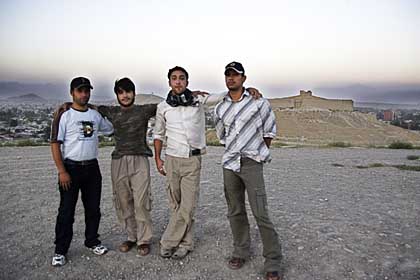
The sun had set and Abdul Karim wanted me to keep my end of the bargain. The young men also wanted me to visit their homes. Perhaps they could take me out the following day they suggested. They knew great places for photography. We exchanged mobile phone numbers. Undiplomatically, I suggested that perhaps they too could come to Abdul Karim?s and then I could go with them to their homes. One young man took me aside and explained that they couldn’t go. It would be breaking purdah. I wondered how I had become an exception to the rule.
Abdul Karim, his mother, Bibi Shirin, his wife Ayesha, and their two children Mehjebeen and Sufia lived in this one room flat. There were mattresses on the floor and one television set and one radio. There was a tiny courtyard and metal steps that went up to what looked like a loft. Abdul Karim had worked as an engineer in the marines and was now out of a job. He showed me the children’s book he used, to try and teach himself English. Even with body language and the best of intentions, our communication faltered, but there was no mistaking that I was a welcome guest, and my major challenge that evening was leaving without having dinner with the family. The path outside was by now pitch black, and Abdul Karim walked me through the maze and got me to a cab. We parted with some sadness.
Back at the Aina office where I was staying, the guard with the Kalashnikov welcomed me with a smile. I could see why my colleague Nazrul hadn’t left the compound for the last two months.
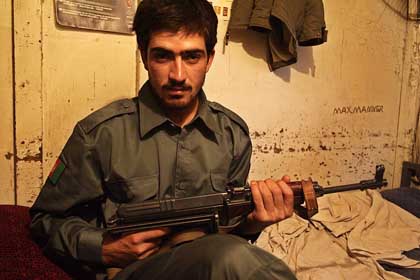
Day before yesterday we drove up to Salang, past the bombed out ruins of what had been thriving villages, past the tank carcasses, past vast stretches of barren land, interspersed with lush foliage by the river beds. A young man took great pleasure in racing his steed against our minivan. Two boys flagged me down, insisting that their friendship be recorded in my camera.
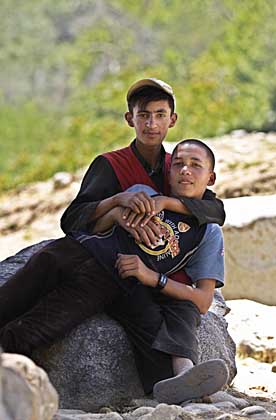
Back in Kabul, I did walk out on my own, without an escort, and went to the marketplace. The men in the bakery insisted that I try their freshly baked bread and I briefly sat with new found friends and watched Hindi films in the restaurants.
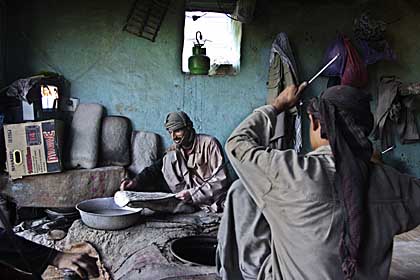
I spoke to Arif who ran a small studio, and came across the out of work labourers in the market square looking for work. A child and an old man reached into the gutter to pick up a polythene bag they could sell. It was in a worker’s face that I realized why people who are capable of so much hospitality, and are so willing to give, have become objects of terror to the foreigners who live here.
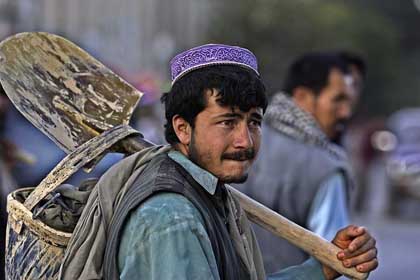
They want the very things that the west has officially championed. Jobs, security, a home for their families and for their land to be free of occupation.
Organisers at the Sarina Hotel claimed it was the first fashion show in 20 years in Afghanistan. There were few tell tale signs of the riots that had taken place here a few days ago. But the white Land Rovers outside, four sets of security barriers, and the armed US soldiers on guard, marked the distance between central Kabul and the rest of the country.
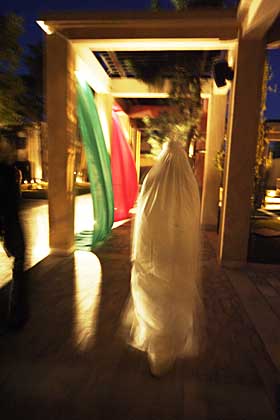
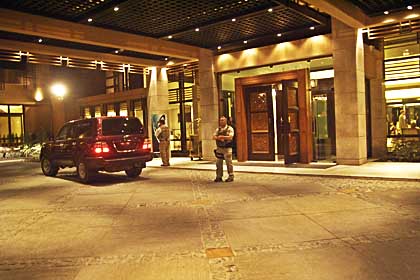
I remember Tolstoy’s words “I sit on a man’s back, choking him, and making him carry me, and yet assure myself and others that I am very sorry for him and wish to ease his lot by any means possible, except getting off his back.” They seem to have learned little in 120 years.
Choroi Malek Asghar
Kabul
9th July 2006
These strangers are family now
PHOTOS and TEXT by SHEHAB UDDIN
Nepal Times Issue #304 (30 June 06 – 06 July 06)
Most people find shelters for senior citizens depressing and avoid visiting them. But working on this photo feature at the Pashupati Bridhashram over the past six months, I have been inexplicably uplifted. I forget the stress of living in Kathmandu and my homesickness for my native Bangladesh. I feel fortunate that I have a family, as many of the senior citizens once had. But what gives me hope is that even though they have lost families and possessions, they still care. They care for each other and they retain a deep sense of humanity. The story of how they landed up here is almost always the same: in their old age they became a burden on their families who dumped them at Pashupati. For the elderly, it?s sometimes a relief that they are in such a holy place and don?t have to bear the taunts of a home where they are no longer welcome. None of them came here willingly and no one has anywhere to go. The Pashupati Bridhashram is run by the government so its budget is limited, it is congested, short-staffed and shows signs of mismanagement. There are 230 residents, 140 of them women.

GREETING: ?Namaste, aram?? That is how Sankule Lati, 77, greets strangers with a namaste and a quick tilt to her head.

LAUGHING: Til Kumari Khatri, 71, and Yadongba Tamang, 70, laugh and play like children. Til Kumari has been here since 1998. Her daughter-in-law brought her to the shelter one day and left saying: ?I?ll be back soon.? She never came back.

CHANTING: Every morning and evening residents gather for bhajans. Those who can?t walk to the prayer room chant from their own beds.

BATHING: Dhana Kumari Ranabhat, 99, takes a bath with the help of her husband Dil Bahadhur Ranabhat, 90. The couple is lucky, few here still have their spouses. Dhana Kumari was forced here after her husband died but married Dil Bahadhur, a retired soldier.

CHATTING: Tirtha Maya Thapa, 75 and Man Kumari Thapa, 75, sit and chat. Tirtha Maya was so busy taking care of her parents, she never married. But after they died, her relatives evicted her from her house. Man Kumari?s long lost son came and took her home a few months ago.

EATING: Bishnumaya Lati, 72, takes her evening meal with her two favourite dogs in attendance. She lives here with her husband.

COOKING: Kanchi Khatri cooks food in the shelter. She was the maid servant at the home of an astrologer and when she was no longer able to work nine years ago, her employer brought her here.

PRAYING: Laxmi Thapa, 68, prays to a wall full of pictures of the gods. She doesn?t remember where she was born or her family since she was married very young. Laxmi worked as a domestic all her life. Her alcoholic husband used to beat her up. When she broke her arm, her employer abandoned her so she came here. Now she prays all the time. ?I spent all my life helping others,? she says, ?now there is no one to help me.?

FEEDING: Dipa Thapa, 75, has two pet cats in the shelter. They are her only friends. She used to sell flowers in Pashupati and when her husband died, she came here.

COMBING: Ratna Maya Katiwada, 68, has kept to herself since she came here three years ago. No one knows the whereabouts of her family or where she is from.

RECITING: Shanti Tuladhar recites a poem from her book, Unko Samjhana. She loves poetry and is still writing. Married at 30, her husband was in the army and when he died 12 years ago, she was sent here. Shanti doesn?t like to talk about her son. She reads us her favourite poem:

In my old age
Shanti Tuladhar
My sons have grown up
Huts have turned into high-rises
They?re adding floors one by one
For me, there is just the pyre left
As the house grew taller
We were pushed lower
Lower than the staircase dark and dank
My son has grown up but what has he done?
I became a burden and he brought me here
My family is foreign forever,
These strangers are family now.
—————————————————————————–
to publish these pictures or others from Drik Picture Library, please contact:
Asia
Mr. Md. Abdullah Al – Faruque
Photo Librarian
Drik Picture Library Ltd.
House # 58
Road # 15A (New)
Dhanmondi R/A
Dhaka – 1209
Bangladesh
Tel: +8802-8112954, 8123412, 9120125
Fax: +8802-9115044
Mobile: +8801711177840
email: library@drik.net
web: www.majorityworld.com
Rest of the World
Mr Rowan Watts
Majority World (UK)
29 Walter Bigg Way
Wallingford
Oxfordshire
OX10 8FB
The United Kingdom
Tel: +44 1491 832627
Mobile: +44 (0)776 599 1874
skype: creativexec
email: creativexec@aol.com
web: www.majorityworld.com
